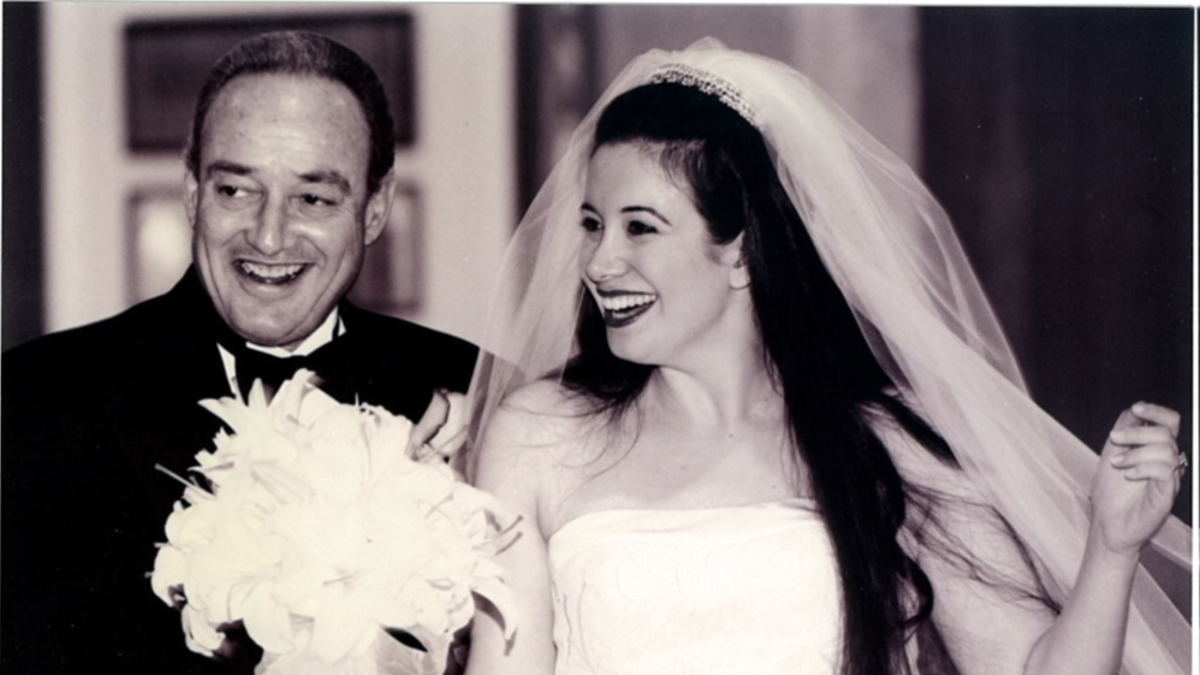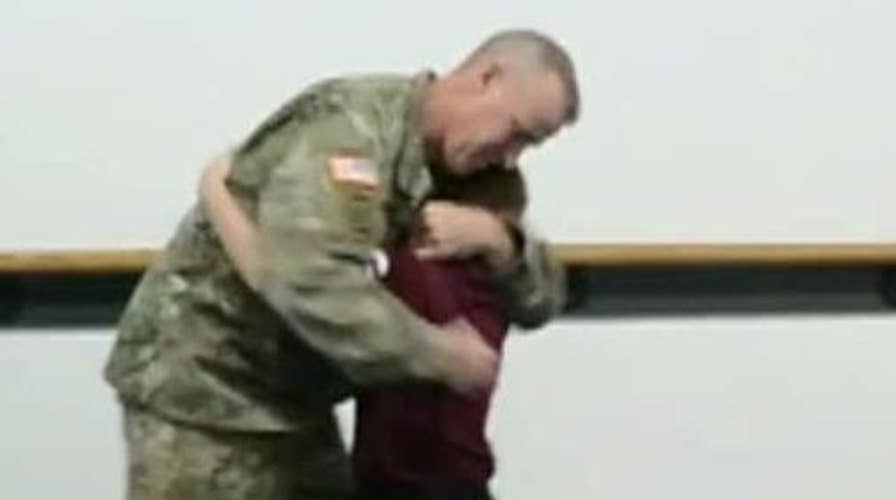Father deployed with the Army National Guard returns to surprise his son at taekwondo class
Staff Sgt. Rob Cesternino surprises his 9-year-old son, Luca, after a ten-month deployment oversees.
My father was my best friend, teacher of myriad life lessons and giver of gifts for life. When I didn’t play much during my first year in softball — because, frankly, I was lousy — he taught me the value of practice, working with me on form every single day. The following year, and every year after, I made the all-star team using my dad’s advice, including "watch the ball all the way into your mitt" and "get your mitt on the ground."
He also taught me my work ethic, both by example (he was up every morning at 4:15 for 40 years, working as an electrician, often outside in freezing temperatures) and by kicking off my work career early. When I wanted to attend day camp at age 12, he signed me up to work in the kitchen, where I spent eight weeks making peanut butter and jelly sandwiches and doing other kitchen-based work for the campers.
He also gave me love, loyalty, wisdom and so many gifts for which I am truly grateful.
TO BE A GOOD FATHER, YOU DON'T HAVE TO BE A SUPERHERO
But, of all the gifts and lessons he gave to me, the most important was to be prepared. After going through a number of losses as a family, including my mother at age 51 and my step-mother at 55, my father decided that he needed to prepare my sister and me in the event that something were to happen to him.
While no man wants to think about his mortality, planning for emergencies and passing is the biggest gift you can leave for your loved ones.
He came over to my house one day with a bunch of information on his wishes, as well as important documents and other paperwork. I shoved all of this information into a filing folder and threw the file in my desk drawer. Now, even though I had been through tragedies multiple times before, it still didn’t register to me that this was important to do.
The months went on and I added more things to the file. There were spare keys to his house, car and safety deposit box. There were wishes about what to do if he were to be in a coma. There were copies of important policies. He even wrote his own obituary!
Six years ago, I was getting ready to leave for a meeting when my phone rang. It was my sister, panicked. She said that our vibrant and healthy father had been in a freak accident and was taken to a local hospital. She asked me to “grab the file” and meet her there.
The hospital scenario was a highly stressful one, but we were as prepared as we could be. I got out the file and found my healthcare power of attorney, which allowed the hospital to follow my instructions. A key to his car to move it from the accident site was there. His healthcare instructions were also located in the file, detailing that my father did want them to attempt risky brain surgery to try to save him. When the brain surgery didn’t wake him, his instructions also detailed getting a couple of opinions and if the opinions showed no strong chance of recovery, to remove him from life support.
My father did not make it. And, my sister and I were left with hearts full of grief, to do the things one must do in this situation, including laying his body to rest and wrapping up his personal affairs.
The gift that my father gave us of having a roadmap of what to do and how to do it was invaluable. We knew who to contact and where to reach them. We knew his wishes for the services and burial. We knew what not to spend money on. And, as we wrapped his personal affairs, we had all of the relevant information to find his accounts and policies — and importantly to know that we weren’t missing anything.

The author with her father Bernie Schneiderman at her wedding in October 1999. (Courtesy of the author)
While you might not expect being in a medical emergency, or god forbid passing, would your family know what to do? Would they have to bear the burden of making difficult decisions? Would they spend thousands of dollars extra on funeral plans? Would they know how and where to access all of your personal information? Would it take them dozens or hundreds of hours to track it all down?
The biggest gift you can give your family is to prepare for the unexpected. We took the prototype my father had given us as the basis to create our own product — a kit that helps you to organize your information and wishes and give your loved ones a roadmap to follow when dealing with aging, emergencies or a passing — called Future File. It’s a great resource if you want a step-by-step guide to helping you organize. But, if you want to go it alone, below are some of the areas we suggest that you think through and organize, at a minimum:
- Your wishes, incorporated into formal legal documents, including living wills and formal care directives (including those for dementia; there are even free ones you can use as a discussion point with family);
- Medical histories, insurance and other care information;
- Any policies that cover long-term incapacitation;
- End-of-life wishes and instructions;
- End-of-life budgets and any policies that cover these costs;
- All of your personal information (from social security number to mother’s maiden name);
- Contact information for all of your key advisors, as well as friends, family and work personnel;
- All personal documents and policy paperwork, from pensions to insurance policies (and make sure that the beneficiary information matches your will and wishes, as the beneficiary data supersedes whatever is in the will);
- Personal remembrances for your key loved ones, to let them know your feelings and to carry on your legacy.
- Business interests, real estate (and any documents, like mortgages or deeds) and financial accounts (and how to access them, including online accounts and cryptocurrency); and
- Spare keys (or the locations thereof) for storage lockers, safety deposit boxes and even to access your residence can save hours of hunting time for your loved ones.
CLICK HERE TO GET THE FOX NEWS APP
As this can be a daunting task if you try to go it alone, if you need assistance, a legacy and wishes planning system like the one we created with Future File can help walk you through everything you need, to make sure you have thought of everything and have it easily organized and accessible by those who need it.
While no man (or woman) wants to think about his or her mortality, planning for emergencies and passing is the biggest gift you can leave for your loved ones. I know, as it was the last great gift my father gave to me.









































